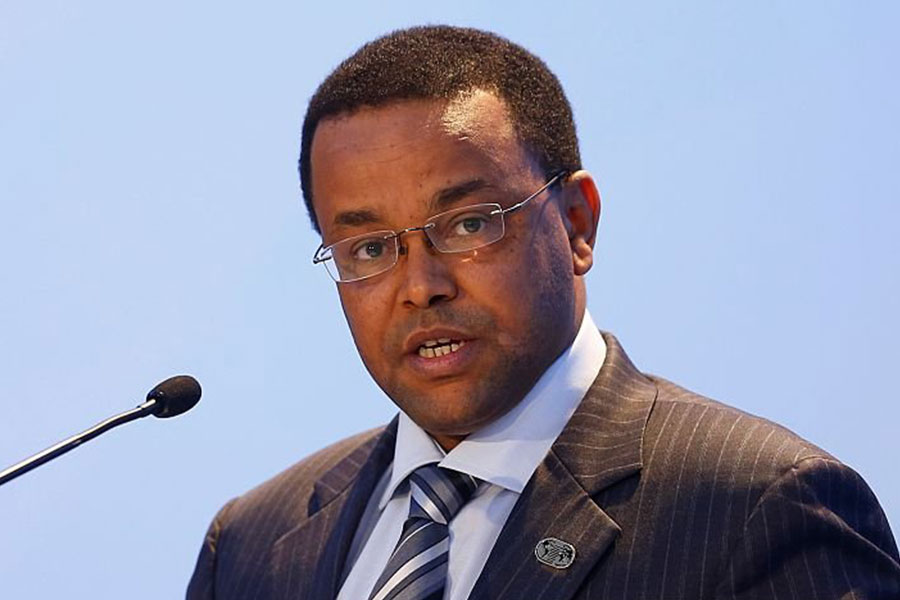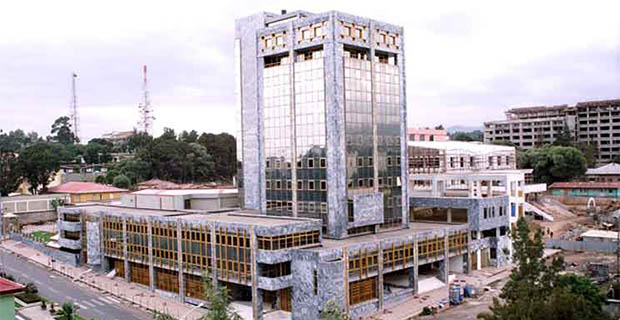
Bunna International Bank netted 440.3 million Br in profit during the last fiscal year, a 4.6pc decline from the year before. The Bank's earnings per share (EPS) also receded by 21.6pc to 225 Br.
The reduction in EPS has been caused by a decline in profit after tax combined with a fresh capital injection, which reached 2.2 billion Br, recording a 22.4pc rise from the previous year.
This must be disappointing news to the shareholders, according to Abdulmenan Mohammed, a financial statement analyst.
Aklilu Tesfa, a founding shareholder at Bunna, was discontented with the profit decline. He says that he bought shares at the Bank convinced by the promoters' great vision of reaching out to people with low income. He then joined the Bank with 10,000 Br worth of shares, and the value tripled after extra investments including from the dividends he receives.
"The Bank's expense is increasing year on year, while profit and return for the shareholders remain consistent," said Aklilu, who was unhappy with the proposal for a raise in board remuneration made during the general assembly that was held last month.
The financial statement of the Bank shows that the decline in fees and commissions and in gains from foreign exchange dealings coupled with a significant increase in expenses were the main culprits behind the reduction of profit after tax.
Sewale Abate (PhD), the board chairperson of Bunna, also echoed the wane in foreign currency earnings as a cause for the profit decline.
The Novel Coronavirus (COVID-19) pandemic and the social and political unrest in the country were also challenges to local and international economic activities, according to Sewale.
“Due to these [issues], the amount of foreign currency the Bank mobilised has shown an 18pc reduction,” he remarked, “this by default resulted in a decline in the attended profit.”
Bunna's gains on foreign exchange dealings decreased by 32pc to 52.5 million Br, while fees and commissions dropped by six percent to 390 million Br. However, income from interest on loans, advances, NBE bonds, treasury bills, and other deposits surged by 30.8c to 1.7 billion Br. Other income also increased by five percent to 60.6 million Br.
Mulugeta Alemayehu, CEO of Bunna, also stated that the management made a strategic decision to carry out a financial restructuring aimed at driving organic growth.
"In this process, we expected a profit decline," he said. "But we'll get the desired results after completing the process."
Expenses at Bunna have also spiked. Interest on deposits rose by 23pc to 542 million Br, while personnel expense grew by 32.6pc to 532 million Br. Other operating expenses reached 444.4 million Br, a whopping 40.7pc surge.
Over the past year, the Bank has managed to open 37 branches, of which one-third of them were in the capital. It currently has 242 branches operating with 2,043 employees, 665 of whom were hired in the reporting period.
The significant increase in expenses undermined the revenues generated by the Bank, leading to reduced profit after tax, according to Abdulmenan.
Mulugeta argues that the rise in expenses might not always be alarming. He says the rise of expenses on interest shows that the Bank has mobilised a higher amount of resources.
"And they're unavoidable expenses," he said.
Bunna's provision for impairment of loans and other assets soared by 44pc to 73.2 million Br. This provision represents 16.6pc of the profit after tax.
“This shows that Bunna needs to pay attention to bad credit,” said Abdulmenan.
Mulugeta explains that the figure might not indicate bad loans, rather the higher amount of loans and advances disbursed by the Bank.
"Besides, loan repayment was one of the areas that were highly affected by the pandemic," Mulugeta said. "Borrowers from the hotel and tourism industry as well as export businesses were very much challenged to service their debts."
Bunna’s total assets increased by 30pc to 18.9 billion Br. The total loans and advances of Bunna went up by 39.4pc to 11.4 billion Br, and its total deposits hit 13.9 billion Br, an increase of 31pc, leading its loan-to-deposit ratio to grow to 83.3pc from 77pc.
The loan-to-deposit ratio is very high, according to Abdulmenan, who recommends the management take extra caution as this may undermine its liquidity.
Mulugeta believes that the loan-to-deposit ratio cannot be the sole liquidity analysis indicator. He says that the Bank uses cash flow to observe its liquidity status.
"Even during last year's liquidity crunch," he said, "I can say we're one of the least affected banks. We took no more than a 30-million-Br loan from the central bank."
To offset last year's liquidity crunch, the likes of which had not been seen in the past two decades, the central bank availed 14.5 billion Br in loans to the banks in two rounds at a competitive bidding interest rate.
Bunna's investment in NBE five-year bonds decreased by 22.6pc to nearly 2.7 billion Br. The investment represents 14pc of total assets and 16.2pc of total deposits of the Bank.
The liquidity position of Bunna increased in value and relative terms. Bunna’s cash and bank balances increased by 33pc to just above three billion Br. The ratio of liquid assets to total assets rose to 16pc from 15.7pc.
Bunna, whose liabilities reached 15.8 billion Br, a 30pc increase, has capital and non-distributable reserves of 2.8 billion Br and a capital adequacy ratio (CAR) of 24.7pc.
This shows Bunna has a strong capital base, according to Abdulmenan.
PUBLISHED ON
Jan 16,2021 [ VOL
21 , NO
1081]

Fortune News | Jun 18,2022

Radar | Aug 18,2024

Radar | May 06,2023

Fortune News | Aug 03,2019

Radar | Mar 27,2021

Dec 22 , 2024 . By TIZITA SHEWAFERAW
Charged with transforming colossal state-owned enterprises into modern and competitiv...

Aug 18 , 2024 . By AKSAH ITALO
Although predictable Yonas Zerihun's job in the ride-hailing service is not immune to...

Jul 28 , 2024 . By TIZITA SHEWAFERAW
Unhabitual, perhaps too many, Samuel Gebreyohannes, 38, used to occasionally enjoy a couple of beers at breakfast. However, he recently swit...

Jul 13 , 2024 . By AKSAH ITALO
Investors who rely on tractors, trucks, and field vehicles for commuting, transporting commodities, and f...

Oct 11 , 2025
Ladislas Farago, a roving Associated Press (AP) correspondent, arrived in Ethiopia in...

Oct 4 , 2025
Eyob Tekalegn (PhD) had been in the Governor's chair for only weeks when, on Septembe...

Sep 27 , 2025
Four years into an experiment with “shock therapy” in education, the national moo...

Sep 20 , 2025
Getachew Reda's return to the national stage was always going to stir attention. Once...